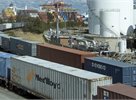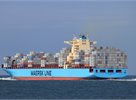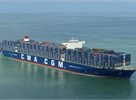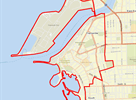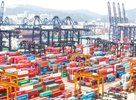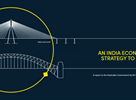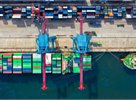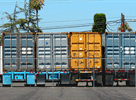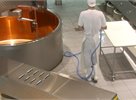
Maersk to launch carbon neutral vessel
A.P. Moller - Maersk has accelerated efforts to decarbonise marine operations with the launch of the world’s first carbon neutral liner vessel in 2023 - seven years ahead of the initial 2030-ambition.
All future Maersk owned new buildings will have dual fuel technology installed, enabling either carbon neutral operations or operation on standard very low sulphur fuel oil (VLSFO).
“A.P. Moller - Maersk’s ambition is to lead the way in decarbonising global logistics. Our customers expect us to help them decarbonise their global supply chains, and we are embracing the challenge, working on solving the practical, technical and safety challenges inherent in the carbon neutral fuels we need in the future. Our ambition to have a carbon neutral fleet by 2050 was a moonshot when we announced in 2018. Today we see it as a challenging, yet achievable target to reach,” says Søren Skou, CEO, A.P. Moller - Maersk.
Around half of Maersk’s 200 largest customers have set – or are in the process of setting – ambitious science-based or zero carbon targets for their supply chains, and the figure is on the rise.
Maersk’s methanol feeder vessel will have a capacity of around 2000 TEU and be deployed in one of its intra-regional networks. While the vessel will be able to operate on standard VLSFO, the plan is to operate the vessel on carbon neutral e-methanol or sustainable bio-methanol from day one.
“It will be a significant challenge to source an adequate supply of carbon neutral methanol within our timeline to pioneer this technology. Our success relies on customers embracing this groundbreaking product and strengthened collaboration with fuel manufacturers, technology partners and developers to ramp up production fast enough. We believe our aspiration to put the world’s first carbon neutral liner vessel in operation by 2023 is the best way to kick start the rapid scaling of carbon neutral fuels we will need,” says Henriette Hallberg Thygesen, CEO of Fleet & Strategic Brands, A.P. Moller - Maersk.
Both the methanol-fueled feeder vessel and the decision to install dual fuel engines on future newbuildings are part of Maersk’s ongoing fleet replacement. CAPEX implications will be manageable and are included in current guidance.
A carbon neutral future for shipping requires innovation, test and collaboration across multiple industry partners. Maersk continues to explore several carbon neutral fuel pathways and expects multiple fuel solutions to exist alongside each other in the future. Methanol (e-methanol and bio-methanol), alcohol-lignin blends and ammonia remain the primary fuel candidates for the future.
A key collaboration partner is the Mærsk Mc-Kinney Møller Center for Zero Carbon Shipping, an independent, non-profit research and development center, that works across sectors, organisations, research areas and regulators to accelerate the development and implementation of new energy systems and technologies.
Reference:
Freightweek.org. 2021. Maersk to launch carbon neutral vessel. [online] Available at: <https://www.freightweek.org/index.php/en/latest-news/5704-maersk-to-launch-carbon-neutral-vessel> [Accessed 2 March 2021].
-
Australian Governments Modern Manufacturing Strategy
-
Boxship owners see 13-year high in charter rates as carriers hunt for tonnage
-
DP World and UNICEF to support COVID-19 vaccine distribution
-
Buoyant ocean carriers set to roll out peak season surcharges months early
-
Trade protectionism a barrier to the recovery of global economies, warns ICS
-
Outlook for large widebody looks chilly in a hot freighter conversion market
-
EVEN AS THE WORLD STRUGGLES
-
Maersk to launch carbon neutral vessel
-
STATE PREMIERS URGED TO INTERVENE ON CROSS-BORDER ISSUES
-
PORT BOTANY RAIL DUPLICATION FAST TRACKED
-
Covid vaccine: is air cargo ready for 'the biggest product launch in history?
-
Logistics protests as Melbourne lockdown puts the brakes on supply chains
-
Demand driving transpacific prices sky high, with Asia-Europe benefiting too
-
Carriers follow through with capacity disicpline and blank more sailings
-
Indonesian Free Trade Agreement - economic opportunity opens up
-
Department of Agriculture turns away import vessel
-
Good Compliance Update - December 2019
-
Scale-less weighing of containers for SOLAS VGM
-
Patrick East Swanson Terminal Melbourne - Reductions in night shift road R&D operations
-
Shippers brace for delays as coronavirus keeps China's factories closed
-
Coronavirus containment measures and the impact on your China cargo.
-
2019/2020 Stink bug seasonal requirements
-
BAF calculator may help ease uncertainty over looming IMO 2020 fuel rule
-
From 15 to 5 in just a few years - shippers' declining choice of container carriers
-
Government money to boost Queensland export
-
Freight forwarding scam warning
-
Marine insurance case study
-
Australian Ports infrastructure not keeping up with global trends
-
Truckies heartened by support to stopping port surcharges
-
Victorian Transport Association (VTA) State Conference 2019 - Making the case for inland rail
-
Protection from tariffs a feature of Australia and Hong Kong deal.
-
BMSB UPDATE 45 - WA Biosecurity Alert












